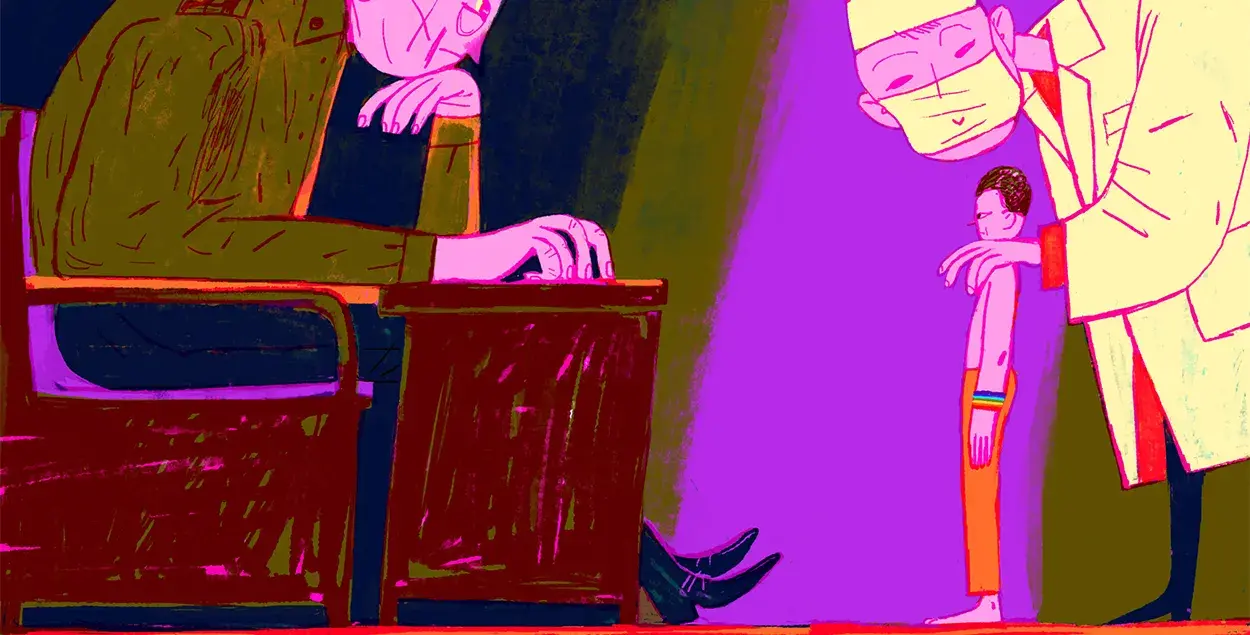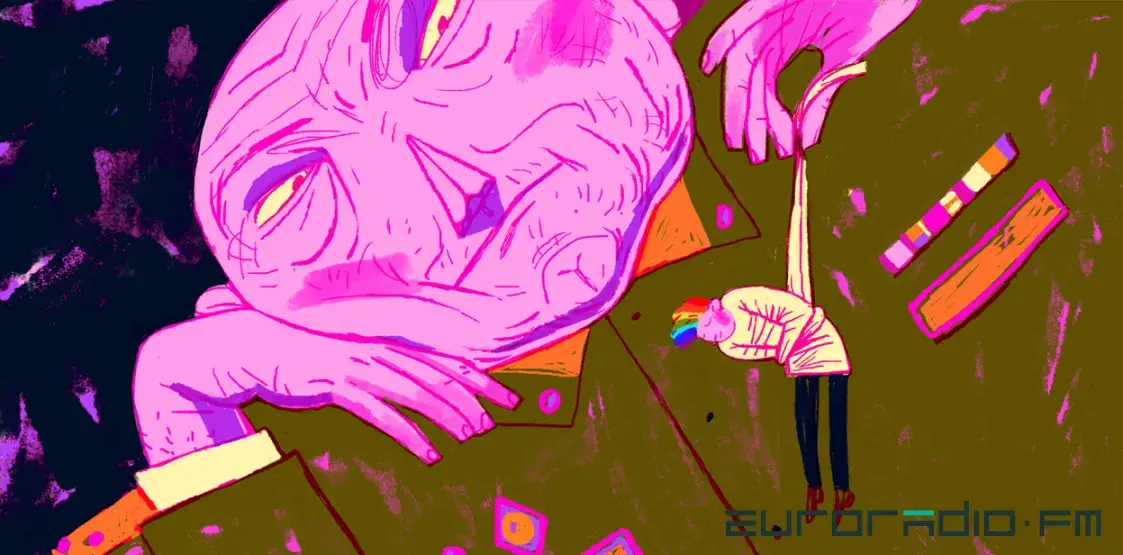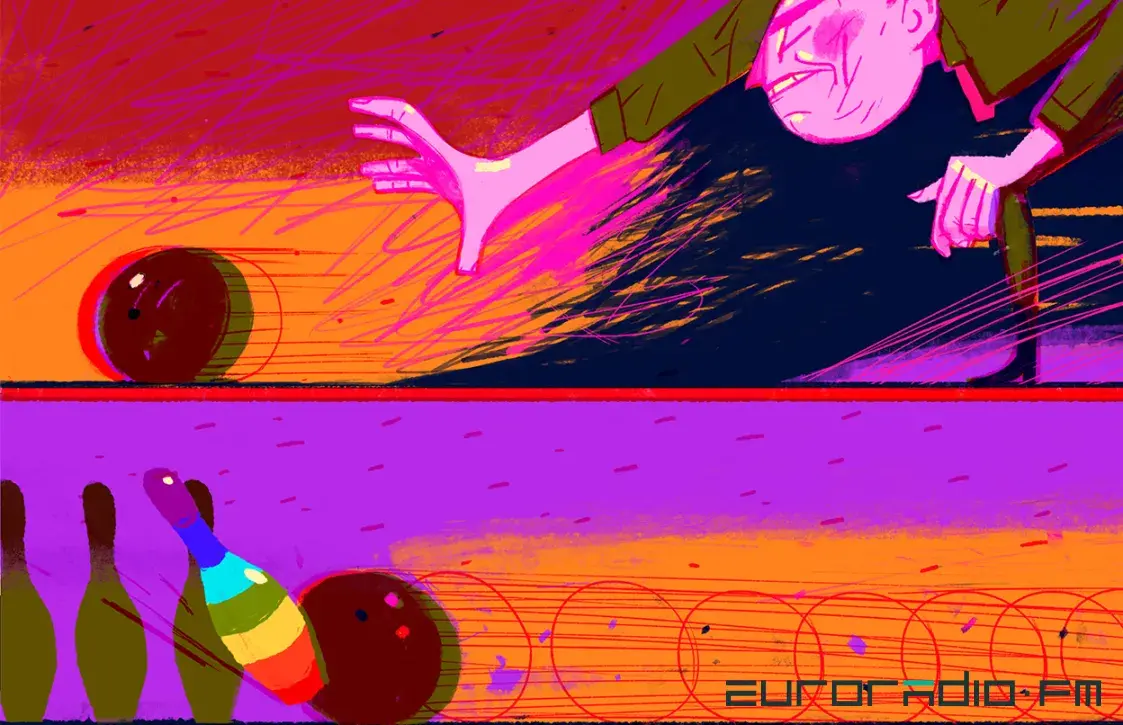Disease of being gay: how military offices send gays to psychiatric screening

"I think they're used to seeing us" / here and below - images by Euroradio
Homosexuality is not a disease. Except for the Belarusian military registration and recruitment offices. They often send homosexuals to psychiatric hospitals for evaluation. Given the reputation of the Belarusian army, most are happy about this, but the point is that de facto orientation is perceived as an aberration. And it is diagnosed as such. They make it look like another diagnosis, of course, they come up with something concurrent.
Euroradio talked to two guys who recently went through regional psychiatric hospitals on referrals from military recruitment offices. And found that the regime had taught them to take it almost as a norm.
From "shave and send to Ukraine" to "discrimination with benefits"
Sasha [name changed] lives in Minsk, but is registered in a regional town, so he took his medical checkup there after graduation. He works in IT, travels a lot, and always knew he did not want to join the army. So, even before I received the summons, I applied to special organizations that help conscripts find illnesses to get a deferment or a military card.
Background: The World Health Organization has not considered homosexuality a disease or an abnormality since 1990, when it revised the International Classification of Diseases (ICD). Belarus did not adopt the ICD-10 until 2002, so in the "list of diseases" used to determine fitness for military service in the early 2000s, "homosexuality" could be found as a subtype of personality disorder. Now, homosexuality is not directly listed in the "List of Diseases," but in the same column there is "Disorders of Sexual Preference" (Article 19).
"The doctors seemed to me to be normal people with a reasonable attitude to life," says Sasha when asked if there was homophobia in the psychiatric hospital. "But the junior staff... Of course there were questions. There was a man, an orderly, who went around yelling at us: "I would shave all you faggots and send you to Ukraine". Well, that's life.
And the doctors were reasonable people, university graduates, educated, with emotional intelligence. On the first day they ask about the diagnoses and complaints that you were sent with, the next day - about the same, and the same happens when you are discharged - at the final board.
Yes, there were comments when they said about the orientation: "Maybe it's just a phase," "Well, we're all experimenting." But then the doctors at the board decided not to diagnose "homosexuality," and chose another diagnosis.

"Which one?"
"I don't know, I didn't see what they wrote - they send you straight to the military recruiting office and that's it. And I have no idea what I have."
Sasha speaks with understanding about the ward itself: yes, it's closed, but it's done "so they don't go drinking", yes, sometimes there are issues with the roommates in the wards, who start asking you when they hear about the orientation: "What's it like?" But Sasha takes it all in stride, adding that he likes talking to people.
"Orientation is not a disease. Why do you think it is enough to be sent from the military registration office to the psychiatric hospital?"
"First of all, thank God there is such a loophole. I don't understand the negativity associated with it. And second of all, the "disease table" says something about personality disorder. And who cares what it says, no one is going to look at the military card. But there is the possibility of not getting drafted. This is, I think, the first time that discrimination has done any good. Maybe there are gay men who want to go into the army. But it's an opportunity for everybody else.
"If it's a disease, let it be a disease"
Ihar [name changed] is from a medium-sized town in Belarus, a teacher by training. He admits that, like most people, he did not want to join the army. He knew that "thanks" to his orientation he could be examined in a psychiatric hospital, but decided that this was not enough and added his anxiety. In the end, he went to the psychiatrist in his small town, gave him the paper from the doctor he had seen before, and got a referral.
"Did they say anything bad, maybe made some homophobic remarks?"
"I think they were used to seeing us. There were boys with painted fingernails and stuff like that. They see us, they give us a referral for an examination."
And in the hospital itself... Well, there are two and a half doctors for the whole ward, and there are some real patients, and we [conscripts] are just in "overnight care". You just lie in bed and that's it. You talk to the doctors a few times.
The psychiatrist was a young woman, adequate, with a head. When they talked about orientation, she said: "Why haven't you told your parents? You should think about it, maybe you should tell them, you're an adult. In general, we talked normally about the problems, about "being gay".
"Why do you call it "gayness"? It's like you agree that it's a disease."
"Somewhere they don't think it's a disease, but Belarus is the way it is now, and until it changes, it will be like that, it will be treated like a disease. That's why I call it that. And I don't want to join the army. So, fine, let it be a disease of "gayness".
Background: Although officially homosexuality is not an abnormality in Belarus, there are different opinions among medical professionals. For example, psychotherapist-sexologist Aleg Khimko, who until recently was the chief sexologist in Minsk, has repeatedly stated that homosexuality is a deviation. A 2017 ECOM (*) survey of Belarusian healthcare workers found that 59% of healthcare workers agreed with the statement "Homosexuality should be accepted in society," 15% supported the position "It cannot be accepted," and 29% were "in favor of none of the statements." Looking at society as a whole, the September 2020 Chatham House poll found (*) that 62.2% said homosexuality should not be accepted in society.
"Your parents didn't know about the whole "set" you were in the hospital with?"
"No. And with others, most of the time parents don't know: you can tell them something different. But we all have some background. That is, if you're gay, you also have some kind of psychological set, some kind of problems, anxiety or depression. And it's not just the orientation that gets you into the hospital, it's also some other diagnoses."

"The choice is between bad and very bad"
"Homosexual and bisexual men, if they have to choose between the army and a psychiatrist, opt for the lesser of two possible evils," says Aleg Razhkou, co-founder of the human rights initiative Journalists for Tolerance. "It is obvious that the atmosphere we have in the army is not far from the atmosphere in prisons. It is a patriarchal system with an institution of well-developed discrimination not only against LGBTQ people, but also against newcomers who are less physically developed."
If you join the army, you can face bullying and physical violence. So the risks once in the army are very high. If on the one hand there are risks, including physical violence, and on the other hand there are procedures of being recognized "inferior," people choose the lesser evil.
The interviewee is sure that if this level of threat in the army did not exist and if there was no choosing between "bad and very bad", then "people would have a much greater potential for resistance to the procedure that they undergo".
"The attitude of the boys themselves towards this system is either Stockholm syndrome or learned helplessness. Isn't there a danger that even after the system changes and the situation of having to choose between bad and very bad things disappears, these [psychological] phenomena will remain?"
"I agree, there's a big problem here. We have queer people who are brought up from childhood in an atmosphere where they are told that they are not normal, that they are different... At some point a person starts to believe that. Or they develop an inner homophobia. I think this is inherent in our region in general, because of the constant pressure and what is projected by both relatives and state institutions and so on. "You're different, there's something wrong with you." And you really start to think that way, deep psychological traumas are inflicted. And even if, for example, a person emigrates to a country where the society has already gone through several stages of development and are ok with different sexual orientations and gender identities, even there it takes a long time for a person to accept that they are normal and do not need to change anything.
***
The two characters of our story now live in Poland. On June 18, they went to their first Pride Parade, a place where you are not judged for who you are, and where you are accepted. They reluctantly recall the experience of living in Belarus, not only with military officers or doctors in the hospital: they associate their future (at least in the current situation) with life in Europe.
Made with the support of Mediaset

















